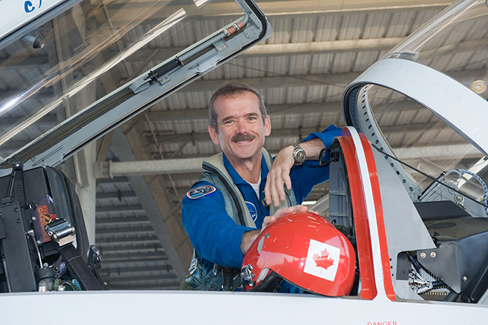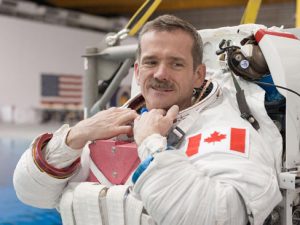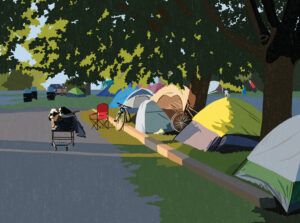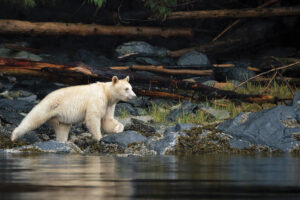
People & Culture
Kahkiihtwaam ee-pee-kiiweehtataahk: Bringing it back home again
The story of how a critically endangered Indigenous language can be saved
- 6310 words
- 26 minutes
This article is over 5 years old and may contain outdated information.
People & Culture

From Asia to Australia and from to outer space to your social media newsfeed, it seems like Chris Hadfield has been everywhere. The Canadian astronaut tweeted his way into millions of Earth-bound hearts and shot to international fame during his five-month mission aboard the International Space Station in 2013. For that and so much more, he’s on Canadian Geographic’s list of 100 Greatest Explorers (see the full roster in the forthcoming June issue). Here he talks about his inspirations, experiences on the road and just some of his many future endeavours.
What is your definition of an explorer?
Someone who not only has curiosity, but an insatiable, restless desire to have their curiosity answered. Every infant learning to walk is an explorer just by nature. They’re putting themselves in new situations and trying to understand the new stimuli that come with it. To me, we are all essentially explorers, but the real difference is: at what point are you content with the answers to your own curiosity? How many hills do you need to continue to look over?
Who were some of your inspirations?
The initial astronauts — Yuri Gagarin, [Alan] Shepard, Neil Armstrong and Buzz Aldrin — very much, they inspired me. A lot of my initial inspirations were imaginary. I was inspired by science-fiction figures, by Star Trek and by the characters in many science-fiction books — the Romantic heroes of Mysterious Island, Captain Nemo and such. But that was fanciful, childish things and I’ve been much more fruitfully inspired by real people since. As I’ve grown older, I’ve realized there is immense inspiration in everybody you talk to.
What motivates you?
I am motivated by a desire to be useful, to feel like I am accomplishing something worthwhile, to satisfy my own internal definition of that and hopefully from an external point of view as well. I want to be useful. I want to feel like the things that I’ve done were worthwhile and accomplished something.
You just finished a U.S. book tour and toured Canada last year. Have you ever felt overwhelmed at any point?
I’ve been on the road at least two-thirds of the time for the last 23 years. As an astronaut, we trained in Japan, Russia, Ukraine, Canada, across the United States, and occasionally under the ocean and occasionally off the world, so I think the definition of being overwhelmed really depends on what your normal standard is and how you deal with it. If a regular, repeated pattern gives you a sense of worth and comfort, then it would probably seem quite overwhelming to constantly be moving and being in new places. For me, the stimulation of being in other places, meeting new people, seeing different things, and understanding that perspective — I find that really invigorating and interesting.
What do you hope to inspire in others?
For them to make decisions in their own life that take them to the limit of their capacity. The biggest tragedy is someone who doesn’t achieve their full potential, either because they never had the chance, they never had the opportunity for education, or they never realized that they could. For me, the biggest accomplishment I can have is to inspire someone to do something that allows them to achieve [the closest] to their full potential.
What’s next for you?
A lot of different things. We’ve written two books … and we have several other books in work. An Astronaut’s Guide to Life on Earth is in the pilot-filming process done by Warner Bros. down in Hollywood. I teach at the University of Waterloo part-time. I’m on the Space Advisory Board for Canada to help try and shape national policy. I have a new album coming out in August — it’s a bunch of music I wrote with my brother and my son and by myself while I was on board the space station, and I recorded it up there. We’re doing an animated YouTube series on the history of science I’ll be narrating and there are a few documentaries in work as well. Some music I wrote has been set to full symphonic work and I did a performance series with the Windsor Symphony. We have one set up with the Vancouver Symphony and I imagine we’ll do that with other symphonies as well. I’ll be doing a speaking, one-man show across Australia in August but I speak regularly all across North America as well. I’m flying an F-86 Sabre out of the Vintage Wings of Canada collection in Gatineau, Que., and it’s lovely; the very first jet fighter that was built and there’s only one flying in Canada. I’ll be flying that at a couple of events this spring and summer. Lots of interesting things keeping me busy.
Are you passionate about Canadian geography?
You can support Canadian Geographic in 3 ways:

People & Culture
The story of how a critically endangered Indigenous language can be saved

Science & Tech
Over the past five months, Commander Chris Hadfield has stolen the hearts of millions as he zooms around the Earth’s orbit, sending tweets to internet users far below. These…

People & Culture
For unhoused residents and those who help them, the pandemic was another wave in a rising tide of challenges

Wildlife
How ‘maas ol, the spirit bear, connects us to the last glacial maximum of the Pacific Northwest